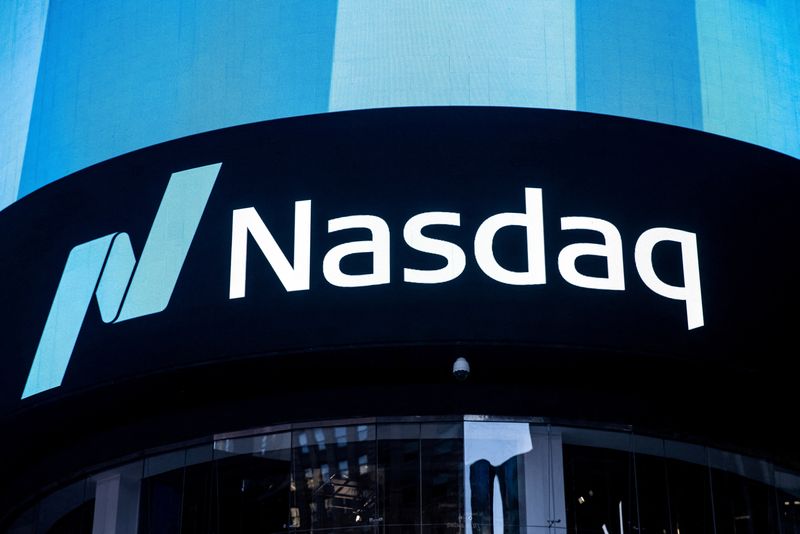 © Reuters. FILE PHOTO: The Nasdaq logo is displayed at the Nasdaq Market site in Times Square in New York City, U.S., December 3, 2021. REUTERS/Jeenah Moon//File Photo
2/3
© Reuters. FILE PHOTO: The Nasdaq logo is displayed at the Nasdaq Market site in Times Square in New York City, U.S., December 3, 2021. REUTERS/Jeenah Moon//File Photo
2/3
By David French
(Reuters) - Wall Street snapped a four-session winning streak on Thursday, with all three benchmarks ending lower after Facebook-owner Meta Platforms' dour forecast sent its stock plummeting and halted a nascent recovery built on upbeat earnings from other big tech.
Meta shares sank 26.4%, wiping around more than $200 billion off its market value, according to Reuters calculations, as it blamed Apple's privacy changes and increased competition from rivals such as TikTok for its disappointing outlook.
The decline in market capitalization was the largest ever recorded by a U.S. company in a single session, eclipsing when Apple Inc (NASDAQ:AAPL) shed $180 billion on Sept. 3, 2020.
In turn, Meta's performance eliminated 0.9% of the Nasdaq's value and cut the S&P 500's combined worth by 0.6%, according to Reuters calculations. The exchanges, respectively, suffered their worst daily falls since September 2020 and February 2021.
Shares of other social media companies also took a beating. Twitter Inc (NYSE:TWTR) dropped 5.6%, while Pinterest (NYSE:PINS) Inc and Snap Inc (NYSE:SNAP) slumped 10.3% and 23.6% respectively ahead of reporting their own earnings after the bell.
Big tech stocks such as Alphabet (NASDAQ:GOOGL) Inc and Microsoft Corp (NASDAQ:MSFT) fell more than 3%, while Amazon.com Inc (NASDAQ:AMZN) slumped 7.8%, before it was scheduled to release results.
"As we've gotten numbers in recent days, what we're seeing is the delivery of earnings being rewarded or penalized, and if you continue to deliver strong earnings growth, the market will reward that," said Maxwell Grinacoff, U.S. equity & derivatives strategist at BNP Paribas (OTC:BNPQY).
"In a rising rate environment, as we progress through the year, we expect to see more divergence between the higher quality names, such as the megacaps, and lower quality names which are not making any money."
Financial technology companies saw a second day of selling, after PayPal Holdings Inc (NASDAQ:PYPL)'s disappointing earnings on Tuesday caused investors to question if these firms - which benefited significantly from the pandemic advancing the shift to digital payments - would justify steep valuations in 2022.
PayPal dropped 6.2%, while peers Block Inc, Affirm Holdings Inc and SoFi Technologies slipped between 4.9% and 11%.
Tech stocks have enjoyed a dominant period amid low interest rates, as investors sought out high growth, but with inflation rising and the U.S. Federal Reserve signaling an aggressive rate-hike stance to rein it in, money managers are having to adjust portfolios accordingly.
"People are going to start increasing allocations to value stocks, and to do that they will have to sell their growth stocks, even if they are down 15% to 30%," said Jack Murphy, co-chief investment officer of Easterly Investment Partners.
The Dow Jones Industrial Average fell 518.17 points, or 1.45%, to 35,111.16, the S&P 500 lost 111.94 points, or 2.44%, to 4,477.44 and the Nasdaq Composite dropped 538.73 points, or 3.74%, to 13,878.82.
Communication services was the worst performer of the major S&P 500 sectors, weighed by Meta's performance.
One of the few bright spots among its sector constituents was T-Mobile US (NASDAQ:TMUS) Inc, which advanced 10.2% after posting both positive numbers and outlook.
The CBOE volatility index, Wall Street's fear gauge, moved up after hitting a near three-week low in the previous session.
Adding to the market's woes was a second rate hike by the Bank of England and a hawkish pivot by the European Central Bank's President Christine Lagarde.
Meanwhile, the number of Americans filing new claims for unemployment benefits fell more than expected last week as COVID-19 infections subsided, suggesting that an anticipated slowdown in job growth in January was likely temporary.
Volume on U.S. exchanges was 10.85 billion shares, compared with the 12.37 billion average for the full session over the last 20 trading days.
The S&P 500 posted 29 new 52-week highs and six new lows; the Nasdaq Composite recorded 34 new highs and 149 new lows.

